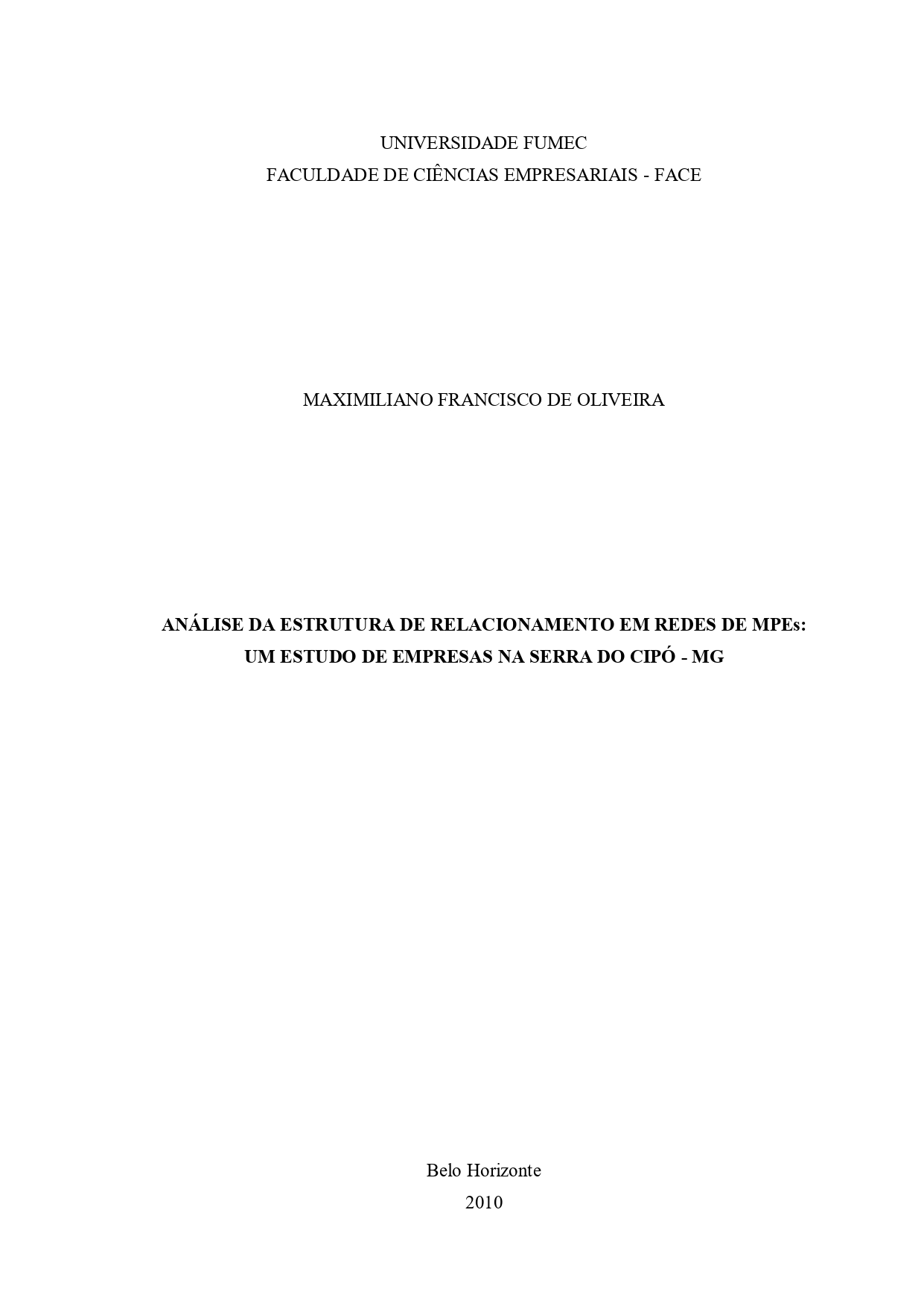Análise da estrutura de relacionamento em redes de MPEs: um estudo de empresas na Serra do Cipó - MG

Visualizar/
Data
2010Autor
Oliveira, Maximiliano Francisco de
xmlui.mirage2.itemSummaryView.MetaData
Mostrar registro completoResumo
O presente trabalho consiste na análise da estrutura de relacionamento entre as pousadas localizadas na Serra do Cipó – MG, tendo como principal objetivo descrever de que maneira tal estrutura, formada por micro e pequenas empresas do mesmo setor, aglomeradas territorialmente, determina a competição, a cooperação e o aprendizado relacional. Objetivase, com isso, contribuir para os estudos das redes interorganizacionais. Para o desenvolvimento da análise, procurou-se verificar a existência, a intensidade, a potencialidade, bem como a relação dos seguintes construtos: atuação em redes, cooperação, política de relacionamento, aprendizagem relacional, competição e fragmentação da rede. Os dados foram coletados por meio da aplicação de um questionário fechado e tratados com o software Ucinet 6.0, apoiado na teoria de análise de redes sociais. Foram utilizadas também técnicas de análise de regressão estatística e, como forma de complementação, entrevistas semiestruturadas, em parte da amostragem. As conclusões iniciais apontaram a presença de todos os construtos analisados, com destaque para a política de relacionamento que atingiu a maior intensidade, seguida, sucessivamente, pela atuação em redes e pelo aprendizado relacional. A competição foi o quesito com menor intensidade, confirmando, juntamente com a pesquisa de postura estratégica, a suposição da possibilidade da coexistência entre cooperação e competição no mesmo contexto. Quanto ao potencial de crescimento, a maioria apresentou tendência positiva, com exceção da competição. Ressalta-se a tendência de fragmentação da rede como forma de interferir nos relacionamentos interorganizacionais. Com base nos testes do modelo hipotético proposto, pode-se supor a existência da relação positiva entre os construtos atuação em redes e cooperação, cooperação e política de relacionamento, cooperação e aprendizagem relacional, aprendizagem relacional e fragmentação da rede. A relação entre fragmentação da rede e competição, cooperação e competição, competição e atuação em redes não apresentou significância estatística, apesar de a literatura oferecer indícios antagônicos. The present work consists on the analysis of the relationship structure among the Inns located in “Serra do Cipó”, Minas Gerais, Brazil. It aims to describe how this structure, formed by micro and small enterprises of the same sector, agglomerated geographically, determines the competition, the cooperation and the relational learning. It aims, with this study, to contribute with the studies of the interorganizational networks. In order to develop the analysis, it was verified the existence, the intensity, the potentiality and the relation of the following constructs: actuation networks, cooperation, relationship policy, relational learning, competition, network fragmentation. The data were collected by means of the application of a closed questionnaire and were treated with the software Ucinet 6.0. It had the support of the theory of analysis of social networks. It was also used techniques of analysis of statistical regression and, as a complementation, it was done semi-structured interviews in part of the sampling. The earlier conclusions showed the presence of all the analyzed constructs, with a emphasis on the relationship policy that reached the highest intensity, followed successively by the actuation networks and by the relational learning. The competition was the construct that presented the lowest intensity, which confirmed, together with the strategic posture research, the supposition of the possibility of coexistence between cooperation and competition in the same context. On the issue of growth, the majority showed positive tendency, except the competition. It is highlighted the tendency of the network fragmentation as a way of interfering in the interorganizational relationship. Based in the tests of the proposed hypothetical model, it can be supposed the existence of positive relation among the constructs actuation networks and cooperation, cooperation and relationship policy, cooperation and relational learning, relational learning and network fragmentation. The relation among network fragmentation and competition, cooperation and competition, competition and network fragmentation did not reach statistical significance, though the antagonistic evidence provided by the scientific literature.
